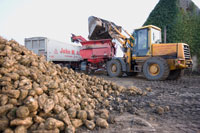US GM sugar beet case takes new twist

Recent plantings of genetically modified sugar beet stecklings, intended to produce seed for a commercial 2012 Roundup Ready sugar beet crop in the USA, could be destroyed.
US District Judge Jeffrey White said conservation and food safety groups challenging the planting of the genetically engineered crop were likely to succeed in their complaints that the US Department of Agriculture was trying to circumvent the law by allowing limited continued planting of the seed stocks without conducting a required environmental review.
Last month, the same judge ruled the USDA’s Animal and Plant Health Inspection Service must conduct a thorough environmental review before GM sugar beet could be replanted.
But APHIS said it intended to allow the beet to be cultivated and handled on a conditional basis during the interim, a process known as partial deregulation, and issued four conditional permits to immediately allow seed producers to plant stecklings.
Those permits were challenged in court by the plaintiffs in the case – the Center for Food Safety, Organic Seed Alliance, the Sierra Club and High Mowing Organic Seeds – arguing they violated the judges previous ruling because the stecklings are grown with the intent of eventually producing seeds.
The judge appears to have rejected an argument from sugar beet seed firms including Monsanto and Syngenta that they needed to issue limited planting permits for research and development, basic seed production and the ability to create commercial seed varieties to meet future demand if APHIS does subsequently authorise production.
He has now instructed the plaintiffs to file proposed remedies by 4 October ahead of a further hearing on 22 October. The plaintiffs are likely to argue for the crops to be destroyed.

